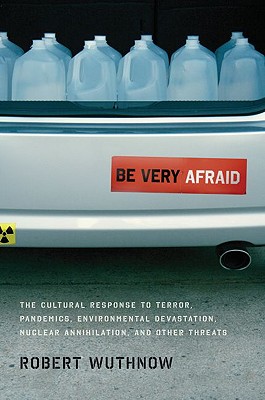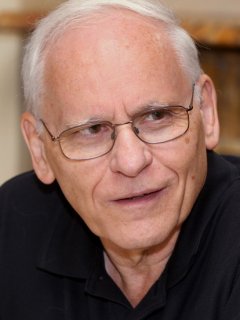

 Oxford University Press, USA
Oxford University Press, USA
Be Very Afraid: The Cultural Response to Terror, Pandemics, Environmental Devastation, Nuclear Annihilation, and Other Threats


Key Metrics
- Robert Wuthnow
- Oxford University Press, USA
- Hardcover
- 9780199730872
- 9.3 X 6.2 X 1 inches
- 1.25 pounds
- Social Science > Disasters & Disaster Relief
- English
 Secure Transaction
Secure TransactionBook Description
In Be Very Afraid, Wuthnow examines the human response to existential threats--once a matter for theology, but now looming before us in multiple forms. Nuclear weapons, pandemics, global warming: each threatens to destroy the planet, or at least to annihilate our species. Freud, he notes, famously taught that the standard psychological response to an overwhelming danger is denial. In fact, Wuthnow writes, the opposite is true: we seek ways of positively meeting the threat, of doing something--anything--even if it's wasteful and time-consuming. The atomic era that began with the bombing of Hiroshima sparked a flurry of activity, ranging from duck-and-cover drills, basement bomb shelters, and marches for a nuclear freeze. All were arguably ineffectual, yet each sprang from an innate desire to take action. It would be one thing if our responses were merely pointless, Wuthnow observes, but they can actually be harmful. Both the public and policymakers tend to model reactions to grave threats on how we met previous ones. The response to the terrorist attacks of 9/11, for example, echoed the Cold War--citizens went out to buy duct tape, mimicking 1950s-era civil defense measures, and the administration launched two costly conflicts overseas.
Offering insight into our responses to everything from An Inconvenient Truth to the bird and swine flu epidemics, Robert Wuthnow provides a profound new understanding of the human reaction to existential vulnerability.
Author Bio
Robert Wuthnow is Gerard R. Andlinger ’52 Professor of Sociology Emeritus and former director of the Princeton University Center for the Study of Religion. He is the author of more than three dozen books and numerous articles about religion, civil society, communities, and American culture.
His major publications about religion include The Restructuring of American Religion: Society and Faith Since World War II; God and Mammon in America; After Heaven: Spirituality in America Since the 1950s; Boundless Faith: The Global Outreach of American Churches; The God Problem: Expressing Faith and Being Reasonable; and most recently What Happens When we Practice Religion? Textures of Devotion in Ordinary Life. A recurring interest in his work on American religion has been its intersection with changing social and cultural conditions. Another interest has been the impact of immigration, which he addressed most specifically in America and the Challenges of Religious Diversity. His work on religion has also been concerned with the relationship of spirituality and the arts, most notably in Creative Spirituality: The Way of the Artist and All in Sync: How Music and Art Are Revitalizing American Religion.
Among his publications on civil society and communities are Acts of Compassion: Caring for Others and Helping Ourselves; Poor Richard’s Principle: Recovering the American Dream through the Moral Dimension of Work, Business, and Money; Saving America? Faith-Based Services and the Future of Civil Society; and most recently Why Religion Is Good for American Democracy. His work on communities has spanned topics ranging from the alleged breakdown of community solidarity, which he addressed in Loose Connections: Joining Together in America’s Fragmented Communities, to a study of micro communities in Sharing the Journey: Support Groups and America’s New Quest for Community, to a series of studies focusing on social change in small towns and rural areas, including Remaking the Heartland: Middle America Since the 1950s; Small-Town America: Finding Community, Shaping the Future; In the Blood: Understanding America’s Farm Families; and The Left Behind: Decline and Rage in Small-Town America.
The interest in cultural sociology that runs through much of his work includes several of his early publications such as Meaning and Moral Order: Explorations in Cultural Analysis and Communities of Discourse and more recent work on such topics as the cultural construction of fear in Be Very Afraid: The Cultural Response to Terror, Pandemics, Environmental Devastation, Nuclear Annihilation, and Other Threats and the role of “othering” in American Misfits and the Making of Middle Class Respectability.
Methodologically, he has been a proponent of mixed methods combining surveys and in-depth qualitative interviews and has been a critic of reliance on flawed surveys in his book Inventing American Religion: Polls, Surveys, and the Tenuous Quest for a Nation’s Faith. He has also made extensive use of historical materials in his writing about religion and politics, two examples of which are Red State Religion: Faith and Politics in America’s Heartland and Rough Country: How Texas Became America’s Most Powerful Bible-belt State.
Reviews of his work, interviews, and op-ed essays have appeared in The New York Times, Washington Post, Los Angeles Times, Books and Culture, Vox, America, Christian Century, and Christianity Today.
Wuthnow has chaired the sociology department at Princeton, served as President of the Society for the Scientific Study of Religion and the Eastern Sociological Society, is a Fellow of the American Academy of Arts and Sciences and a Fellow of the American Philosophical Society, and has received numerous honors and awards for his research, teaching, and publications.
Source: Princeton University Department of Sociology
Videos
No Videos
Community reviews
Write a ReviewNo Community reviews